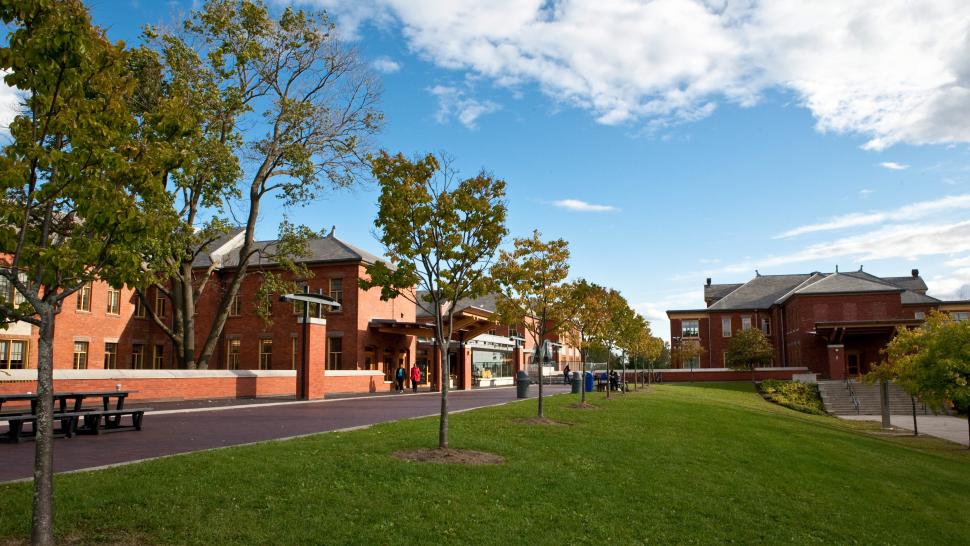
Sustainability specialist Devon Fernandes' hope is that when Humber College students go to class, they know they're part of a sustainable community.
Humber secured its place on the Canada’s Greenest Employers list for another year. Humber College has been recognized five years in a row for its leadership in making sustainability part of its organizational culture.
"We’re one step closer to that culture where every partner, every department and faculty work together to achieve this goal of sustainability," said Fernandes.
This year, Humber adds another feather to its cap. The college was recently ranked by the Sustainability Tracking, Assessment & Rating System (STARS), which sets a global sustainability standard.
Humber has been ranked silver three times. This year the college reached the gold standard.
STARS, a program of the Association for the Advancement of Sustainability in Higher Education, is a self-reporting framework for post-secondary institutions to measure their sustainability performance. The report has 300 data points to evaluate, including how sustainability is incorporated into research and curriculum.
"We're getting to the point where we're sharing our best practices with industry leaders who are interested in what we have to say," he said.
Humber's Office of Sustainability also collected information on less-obvious sustainability actions, like purchasing the most sustainable printer paper or incorporating sustainable food operations into the college.
Above and beyond
Humber College is recognized as a leader in the sector.
The Greenest Employer recognition reflects the institution’s longtime commitment to sustainability across the college.
“We’re going beyond what most organizations are doing in terms of energy savings, but it’s not just the physical building – it has to do with the academic side and learning outcomes,” said Spencer Wood, Director of Facilities Management at Humber.
Wood and his staff had to pivot when COVID-19 changed the department’s summer plans.
When campuses closed in March, the college recognized opportunities to save money and energy by shutting buildings and subsystems down. Energy use is down 40%.
Water use plummeted almost to zero.
There have been some savings in natural gas usage - so much so that the college's supplier called Wood, thinking the low consumption must be a mistake.
Facilities has been careful to bring each system online for a small amount of time to make sure that everything will run smoothly once they're needed.
On campus and at home
According to Devon Fernandes, there have been plenty of unforeseen consequences of COVID-19, and many relate to sustainability.
"The drop in air pollution has been noticed around the world and was really sparked by the need to stay indoors," he said.
"Toronto has a thirty-to-forty per cent reduction of pollutants in the air. You can hear birds and insects when you walk around the city. There's less noise pollution."
The negative consequences have been obvious, including decreased food security. Some are simple, like the increase in waste at home.
The Office of Sustainability has posted a resource to its website with strategies for sustainable living - off campus.
-
Become a green and blue bin expert: The majority of what is tossed in the recycling or compost doesn't actually belong there. If you live in Toronto, you can use the search engine Waste Wizard to learn where you should put your waste.
-
Try for zero waste: If you're up for a challenge, try collecting your trash for one week in a mason jar. It will give you a better idea of how much waste you're actually creating and it's a fun way to hold yourself accountable. If you're using disposable gloves/masks, it's important to properly seal them in a trash bag to avoid contamination.
-
Cold wash and hand dry: Switch to cold water when washing your items and opt to hang them instead of throwing everything into the dryer.
-
Support local: Big-box retailers will always be around, but your favourite local coffee shop that's committed to sustainability might be struggling during the pandemic. If you shop local, you're supporting the local economy, reducing your carbon footprint by travelling less and increasing job opportunities in your community.
-
Compost: It's important to compost food scraps instead of throwing them in the trash. Food scraps that end up in landfill create a potent greenhouse gas called methane. By composting, you're diverting organic waste from landfill and reducing these emissions. Plus, compost is a great addition to soil if you're gardening!
For more resources and tips visit humber.ca/sustainability or @SustainHumber on Twitter and Instagram.